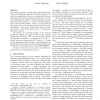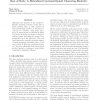39 search results - page 3 / 8 » Web-scale k-means clustering |
113
click to vote
ALGORITHMICA
2005
15 years 1 months ago
2005
We present polynomial upper and lower bounds on the number of iterations performed by the k-means method (a.k.a. Lloyd's method) for k-means clustering. Our upper bounds are ...
101
click to vote
CORR
2011
Springer
14 years 5 months ago
2011
Springer
— This paper shows that the k-means quantization of a signal can be interpreted both as a crisp indicator function and as a fuzzy membership assignment describing fuzzy clusters ...
117
click to vote
CORR
2008
Springer
15 years 1 months ago
2008
Springer
The k-means method is a widely used clustering algorithm. One of its distinguished features is its speed in practice. Its worst-case running-time, however, is exponential, leaving...
104
click to vote
SEMCO
2008
IEEE
15 years 7 months ago
2008
IEEE
Current Semantic Web reasoning systems do not scale to the requirements of their hottest applications, such as analyzing data from millions of mobile devices, dealing with terabyt...
ICML
2007
IEEE
16 years 2 months ago
2007
IEEE
Although each iteration of the popular kMeans clustering heuristic scales well to larger problem sizes, it often requires an unacceptably-high number of iterations to converge to ...


